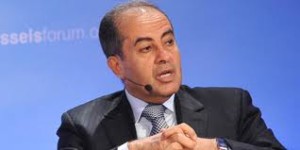Two years after the 2011 movements there are many questions on North Africa’s future
The Spinelli Group: “Did the revolutions fail? Is Europe visibly absent?”

“Many talk about an Arab winter instead of spring because in reality they want a winter – that is stability for the countries under dictatorship.” So, Guy Verhofstadt, President of the Group of Liberals and Democrats for Europe at the European Parliament, opened the conference where the following participated: Néguib Chebbi, Leader of the Democratic Progressive Party in Tunisia; Mahmud Gebril, interim Prime Minister of Libya during the civil war and previously President of the Council on National Transition; Daniel Cohn-Bendit, Co-President of the Greens/European Free Alliance; and Isabelle Durant, Vice-President of the European Parliament.
On the presumed failure of the youth revolution Mahmud Gebril, who represented Libya, sustained: “If we read history hurriedly, then yes it could seem like a failure. But if we reflect, it is not like that: it is a process that has only just begun.” “In this moment – proceeded Gebril – the value system in the new Arab world is different; it is very similar to Europe, the kids dress and have a culture very similar to that of Europe. The youth organized this revolution on the web without a political agenda, without a leader. They asked for liberty, the right to work, a better life, and we still have not seen any of this. In Libya everyone disputes the legitimacy of its own group representation.
Néguib Chebbi, who represented Tunisia, affirmed: “In 2010 the revolution was organized by youth, it was not structured by political parties. It grew from a spontaneous movement and was like an explosion in these countries. In Tunisia we chose a democratic process with elections in October 2011 and the Islamic party won but the people are not happy since they complain about the lack of competence in governing the country. We must have elections again by 2015 and the democratic forces must press on in order to end this phase of transition, otherwise it will end up in a dictatorship.”
Regarding the EU’s role, Mahmud Gebril highlighted that “even Europe gleans an advantage from this phase of transition in North Africa, in fact those who make the decisions on a European level must understand what type of relationship they want to establish with these countries.” Gebril continued lingering on the situation in Syria, “There the population is paying the highest price; many have become refugees, especially children. For this it is necessary that the opposition forces unite in a single structure, otherwise they cannot ask for legitimacy.”
The public asked what the importance is of collaboration established between the EU and North Africa. “The idea of collaboration is a good idea – Néguib Chebbi said – to make Tunisia more competitive but substantial support is lacking – that of transferring technology. In any case democracy is important to the growth of the economy and to a society with equal access to work. Young Tunisians must have the opportunity to develop their abilities and to find a job.”
Meanwhile Mahmud Gerbil affirmed: “Without a democracy there cannot be an economy. They are interrelated. With this collaboration we risk remaining dependent on the EU, while we need to develop programs for technological instruction in North Africa. We need a strategy for renewable energy and for agricultural production; why doesn’t Europe finance this type of project? If in fact from one side Europe is trying to help us, from the other side though they are defending the individual interests of the member states.”
One of the frequent questions is the role of youth after the Arab Spring and, according to Mahmud Gerbil and Néguib Chebbi, “at the end of the revolution a new political class is missing because the youth did not have a political strategy, whereas it is necessary that they are partly active in political life.” “Democracy is a culture before being a political system,” concluded Gerbil.
Irene Giuntella








![Palazzo del Mercosur, targa [foto: imagoeconomica]](https://www.eunews.it/wp-content/uploads/2025/04/Imagoeconomica_2336393-scaled-e1743769770968-120x86.jpg)
